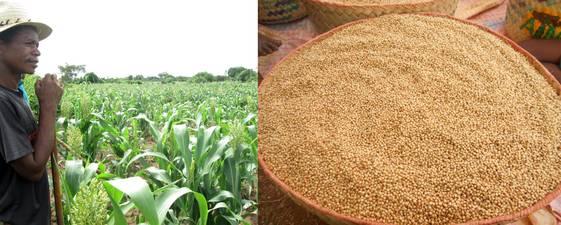- Home
- Worldwide
- CIRAD worldwide
- Projects
- Projet FOOD-SEC
Boosting food crop seed and seedling production chains for food and nutritional security in the countries of the Indian Ocean - FOOD-SEC Semence

Remandetsy et l’une de ces parcelles de production de semences / Semences de sorgho © FAO
Issues
The regional context of the FOOD-SEC Semence project is far from uniform and local needs and expectations vary considerably. On one side are two very poor countries, Madagascar and Comoros, whose primarily agricultural populations have fragile livelihoods that are vulnerable to climate change. Further east are Mauritius and Seychelles, which are more developed with smaller agricultural populations and high dependence on agricultural food imports, which aim to sustainably develop this sector in order to reduce their dependence.
Today, the region faces several challenges:
- Formal seed production sectors, where they exist, function poorly and lack structure, making it impossible to adequately supply the whole country.
- The plant material used and disseminated is insufficiently diversified and adapted, and often has poor health status.
- The official services are inefficient, and where legislative frameworks exist, they are only partially applied.
Description
The project is led by five development research organisations that are partners of PRéRAD-OI, which rely on local agricultural development partners as well as producers’ associations that will act as relay points for the wide dissemination of improved plant material.
The project is built around five activities:
- Developing knowledge of local agro-economic situations and producers’ expectations in terms of seed.
- Building a catalogue of priority elite varieties in each of the target countries.
- Producing improved stock plant material.
- Testing this material in agroecological cropping systems, in field conditions on farms.
- Developing national and regional action plans based on a critical synthesis of all actions conducted.
Expected results
- Providing producers with better access to seed and seedlings that are healthy and if possible certified, from varieties that are adapted to local agroecological conditions, with improved nutritional quality;
- Building actors’ capacities in terms of the multiplication and production of seed and seedlings that are genetically compliant and disease-free;
- Disseminating improved plant material and appropriate agricultural practices further to trials on relay farms, which serve as a showcase and a starting point for wider dissemination in the target areas;
- Promoting and implementing a seed regulation and certification system attached to the authorities in the different countries.
Joint requesting organisations: Centre National de la Recherche Appliquée au Développement Rural de Madagascar (FOFIFA) and Institut de Recherche et de Vulgarisation Alimentaire et Agricole de Maurice (FAREI)
Associated partners: University of Comoros and NBA Seychelles
Partners providing services: Producers’ organisations, Centre de Recherche et de Développement Rural en Agriculture et en Élevage (FIFAMANOR) and Conseil Expérimentation Formation en Fruits et Légumes (CEFFEL) in Madagascar, NGO
























